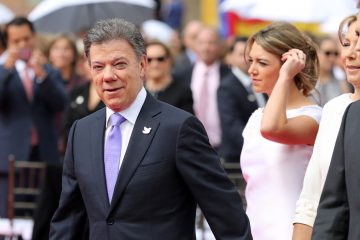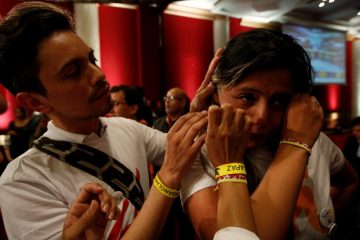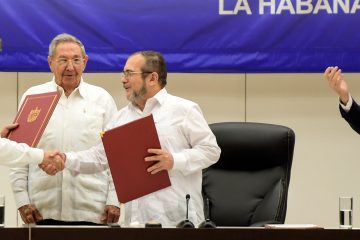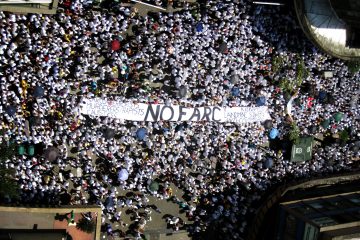Why Police Reform Won’t Do the Trick in Colombia
Times are grim for human rights and the rule of law in Colombia. Since the end of April, tens of thousands of Colombians have taken to the streets after President Iván Duque announced a controversial tax reform. While the government has withdrawn the reform proposal, protests are ongoing as citizens express their frustration over structural inequalities. Discontent is high across the country, especially among lower- and middle-class Colombians who have experienced increased hardship while enduring the COVID-19 pandemic. By 22 June, 83 people were killed and over 1,600 wounded, with much of the violence attributed to the Colombian National Police. The police’s anti-riot unit, known as ESMAD, has become a symbol of disproportionate policing based on the excessive use of force. The Constitution …
When the technical is political: Colombia’s export of security expertise
In a farewell speech to Colombia’s armed forces last year just prior to leaving office, ex-president Juan Manuel Santos boasted: “Today we have the best armed forces in our history.” Proudly, he added: “We’re a global reference!” And indeed, it seems as though Colombia had opened a new chapter. Since the 2016 peace accords with the country’s largest guerrilla organisation, the FARC (Revolutionary Armed Forces of Colombia), the nation appears to be on an uphill climb. With the FARC at the negotiation table, the story goes, the country was finally able to look ahead and dedicate its resources to transition and reconstruction: the reintegration of former combatants, the redistribution of formerly occupied territories, and the recovery of an economy weakened by decades …

Santos got the Nobel Prize for not giving up on peace – here’s why all Colombians won
Only days after the people of Colombia voted to reject a historic peace deal he spent years negotiating, the Colombian president, Juan Manuel Santos, received the Nobel Peace Prize for his efforts to end the country’s decades-long war with the FARC guerrilla movement. The no vote came a week after the government and the FARC had signed a peace deal, and after they had declared a bilateral ceasefire and the end of all hostilities at the end of August. Nevertheless, the Nobel Peace Prize Committee has given Santos and his fellow negotiators a vote of confidence – one that they have earned through years of dogged and determined work. Santos became president in 2010 after serving as defence minister under his presidential predecessor Alvaro …

Colombia has voted no on its plebiscite for peace. Here’s why and what it means
On Sunday, the Colombian people rejected the recent peace deal that the Colombian government had reached with the Revolutionary Armed Forces of Colombia (FARC) after 52 years of civil war. The plebiscite narrowly failed: 50.2 percent rejected the peace accord, while 49.8 percent were in favour. What, exactly, were Colombians voting on? Colombians cast votes on whether they support the peace agreement, reached in August and formally signed on Sept. 26. The content of the 297-page peace accord had been made public before the vote. Who voted no? The “no” vote is not representative of all Colombians. Less than 40 percent of Colombians voted in the plebiscite, leaving many voices unheard. This was partly related to weather conditions; the Caribbean …

A momentous peace deal with the FARC – so what next for Colombia?
The groundbreaking news reached me when I was in Bogotá in a meeting with the head of the Colombian Army: after more than 50 years of armed conflict, and four years of negotiations, the Colombian government and the leftist guerrilla group, the FARC, have reached a final peace agreement. The historic deal looks set to bring to an end the longest running war of recent history. The agreement is cause for huge celebration, but an official end to war with the FARC is only the start of the road to peace. Securing sustainable peace needs a balance of addressing the immediate security risks during the period of transition, as well as anticipating the long-term challenges that may emerge. ‘Yes’ or …

What will the peace process mean for Colombia’s border regions? The government will have to start governing.
The “how” and the “when” of Colombia’s latest peace breakthrough are of course important — but so is the “where” and “with whom.” On June 23, the Colombian government and the Revolutionary Armed Forces of Colombia-People’s Army (FARC) signed a bilateral ceasefire agreement, after more than five decades of armed conflict. For Colombia’s peace process to succeed, it will need to break the cycle of conflict, organized crime and state neglect in Colombia’s border regions. The agreement stipulates that the FARC lay down its weapons within 180 days of a final peace deal, which has a July target date. The disarmament will take place in 23 specific “normalization zones” and eight camps, all of which cease to exist after these 180 days. The …









